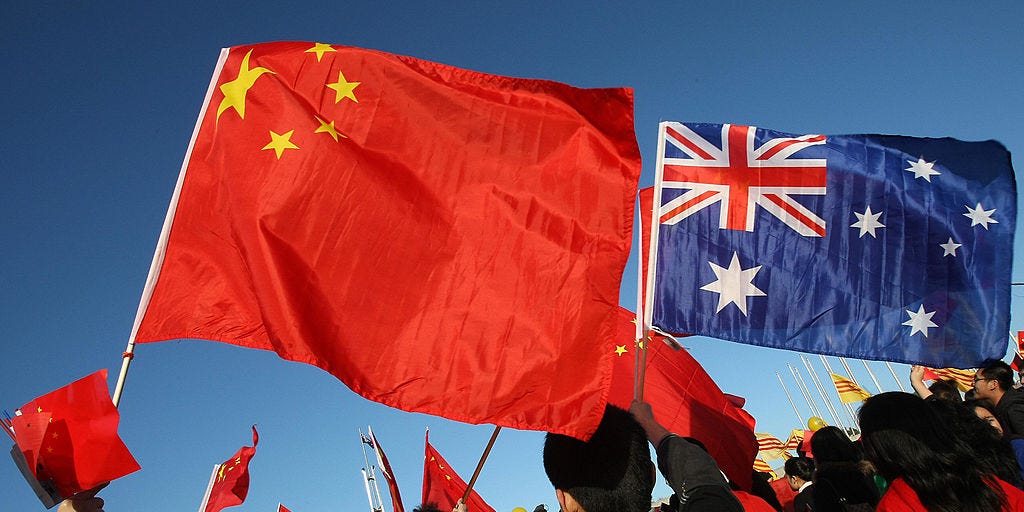
We are familiar with the trade war between the US and China. But, of late, the plummeting relationship between China and Australia has also garnered significant attention.
[You may also read: The trade war between the US and China- Explained]
Since 2009, the economic and cultural relationship between China and Australia has grown considerably, so much so that they have become heavily reliant on each other.
But, this relationship has been steadily deteriorating in the past few years. Australia has always been an opponent of China’s territorial claim to the South China sea. In 2016, it signed a joint statement with Japan and the US in this regard calling for China to abide by the ruling of an international tribunal which held that China has no rights over the territory.
In 2017, the strategic partnership known as ‘Quad’ with like-minded regional states was revived. The Quad includes four countries namely- the United States, Japan, India, and Australia. The purpose of the grouping is to preserve common interests in the Indo-Pacific region and balance China’s growing influence and assertiveness in the region.
Australia has also been wary of growing China’s political interference and espionage activities. The Australian Government had ordered a major inquiry into China’s attempt to influence political activities in the year 2017. Subsequently, it had to pass foreign interference laws.
In 2019, it raised concerns over human rights violations in China. Also, Huawei was banned from building a 5G network over cybersecurity concerns.
[You may also read: Should China’s wet markets be shut down?]
For its part, China has been using administrative issues, licensing changes, export certificates, and safety inspections as excuses for the past three years to halt or disrupt Australian supplies of wine, milk powder and coal to intimidate the country to toe the line.
But, the relationship reached its lowest point in April this year, after China retaliated against Australia due to its demand for an independent probe against the origins of COVID-19. Australia also flagged concerns over the recent change in security law in Hong Kong which could take away certain freedoms from its people like the freedom of assembly and speech, an independent judiciary and some democratic rights
The retaliatory measures taken by China against Australia are:
- China imposed an 80.5% tariff on Australian barley.
- Banned imports of beef from 4 Australian slaughterhouses
- Warned Chinese tourists from traveling to Australia and students to study in Australia ostensibly due to an increase in racist attacks in the country.
- Chinese state-owned enterprises have also curbed investments to the country
- It sentenced an Australian man to death for drug smuggling through opaque court proceedings.
China has been facing global backlash due to its mishandling of the pandemic, but Australia is most economically reliant on China. And, therefore, China’s weaponisation of trade as a geopolitical strategy will affect it adversely.
[You may also read: Companies to move manufacturing out of China– Will India benefit?]
Chinas’s growth in the last decade has been fueled by raw materials from Australia.
Australia supplies 61 percent of China’s iron ore, 53 percent of its coal and 23 percent of its thermal coal. China is Australia’s largest trading partner and accounts for 32.6 % of its exports. China prefers Australia to its competitors due to its higher quality and geographical proximity.
[You may also read: Impact of COVID-19 on Pharmaceutical Sector in India]
Other sectors that are dependent on China’s market are education, tourism, agriculture, wine.
China favours Australia for tourism and education because of its geographical proximity and significant Chinese diaspora in Australia. Australia is home to more than 1.2 million people of Chinese ancestry, many of whom only migrated in the last decade – ensuring deep community links.
That said, Australia’s economy is not very reliant on exports. It makes up 20 % of GDP, but the proceeds flow directly into social welfare. And also, it will be difficult for China as well to replace Australia as a source of its raw materials owing to its higher quality.
Nevertheless, Australia is looking to strengthen its ties with other countries to reduce its economic dependence on China.
Australia held a virtual bilateral summit on June 4 to expand the strategic partnership with India. The countries agreed to cooperate on everything from supply chains to maritime security, water management to agriculture, critical minerals to critical infrastructure and cyberspace.
Also, in his recent address at the Vivekananda International Foundation, which came amid a stand-off between India and China in Ladakh, the Australian High Commissioner to India said – “twenty years ago the Australia-India bilateral defence relationship was nearly non-existent. Today, it is a hive of activity and full of energy and purpose. We are among each others’ top three or four most important defence partners. India and Australia are also gripped with a similar sense of shared purpose as they grapple with the implications of creeping authoritarianism and the risks it poses of democracy, transparency and openness. We have well and truly moved past the three Cs of Cricket, Commonwealth and Curry. The future of the relationship, in my view, is better described as the four Ds — Defence, Democracy, Diaspora and Dosti (what Australians call mateship)”
[You may also read: Everything You Need To Know About China’s OBOR or BRI initiative]
Economyria is now on Telegram. For a simplified analysis of topics related to economy/ business/ finance, subscribe to Economyria on Telegram